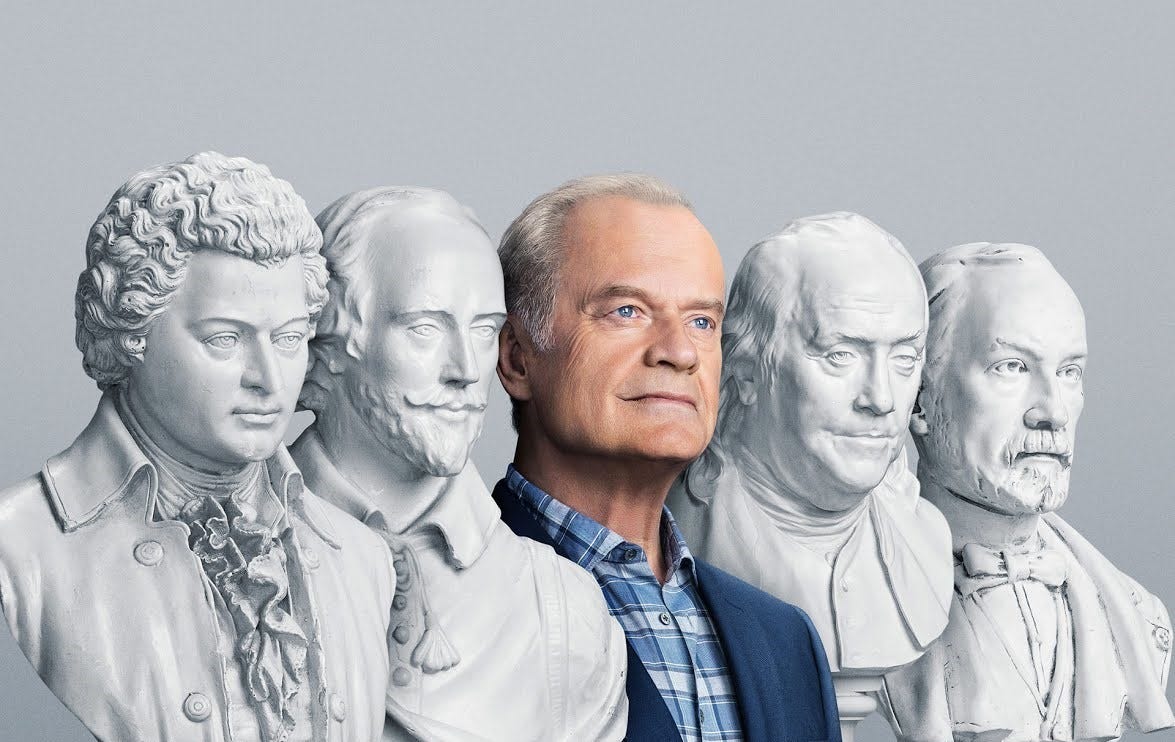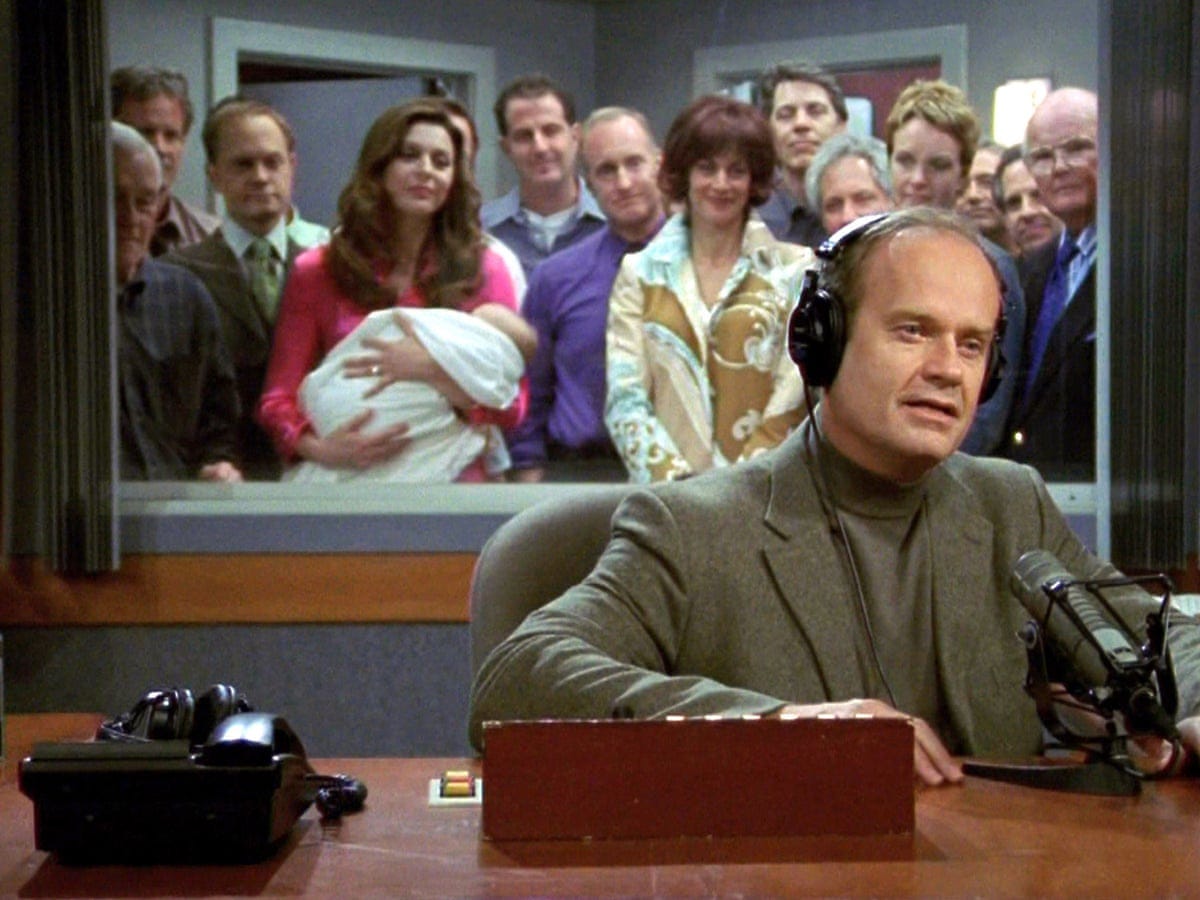Tossed Salad, Scrambled Eggs, & Poetry
Believe it or not, TV's most pretentious popinjay can remind us that poetry really is for everyone.

Since I began writing PopPoetry in 2020, I’ve harped on one point repeatedly: poetry is not just for the most learned among us. Poetry is for everyone.
And who better to prove that, paradoxically, than one of television’s most pretentious characters: Frasier Crane.
Frasier has recently re-entered the public discourse (it never really left, did it?) thanks to a series reboot on Paramount+. And while the reboot is, predictably, not very good, hopefully it’s driving new viewers to the delightfully absurd original recipe series on streaming services.
A vocal aficionado of the finer things in life, Frasier Crane (Kelsey Grammer, of course) never misses an opportunity to let others know how well-read he is. And while so many of the show’s literary references are to novels and plays, there is certainly some poetry to be had—including, importantly, at the series’ end.
Let’s look at the poetry featured in the show’s original series run.
Geoffrey Chaucer, The Canterbury Tales
Season 5, Episode 3, “Halloween”
In this episode, Frasier and Daphne go to a literary-themed Halloween party dressed as Geoffrey Chaucer and the Wife of Bath, respectively. Their friendship and saucy, joking behavior and, of course, a misunderstood overheard conversation, leave Niles sure that Frasier has gotten Daphne pregnant. He hasn’t, but that doesn’t stop Niles from growing his conspiracy theory, which is even more outrageous than his nose—
We also get a heaping helping of Niles as Cyrano de Bergerac, which is endlessly entertaining, even more so because Niles is also uncharacteristically wasted at the party.

In case you zoned out in high school English, The Canterbury Tales are a set of stories in verse that were written and published in the 14th to 15th centuries by Geoffrey Chaucer. Massively important in the history of English Literature, the tales
There’s not much poetry here, but a literary Halloween party makes for a fun and highly farcical episode. It’s also a great conversation starter if you’re watching it with someone else. Eve of Adam & Eve at a literary Halloween party? Progressive!
Limerick Graffito
Season 9, Episode 5, “Love Stinks”
Ah, the limerick. The populist poetic form that loves to cause laughter and outrage, or both simultaneously. In this episode, Frasier discovers a limerick about himself on the bathroom wall at work. Horrified, he reads it out to Niles (worth noting is the toilet paper that Frasier has transcribed the limerick onto, which he brings to the cafe table at Nervosa):
There once was a man, Frasier Crane, Who says he can feel your pain, But he acts like a snob To the guys at his job And I think he's totally lame.
Niles says, “That's terrible!” For a moment, we’re lulled into thinking Niles is supportive of Frasier’s outrage. But then we learn the rile target of Niles’ ire: the poem’s composition itself. “There’s a tense shift,” he catalogs, “an approximate rhyme, the scansion leaves a lot to be desired…” and so on until Frasier stops him, disgusted.
Niles is right: the limerick is capable but not as well-written as it could be. But dang, it takes a lot of pretension to critique a bathroom-wall graffito!
The limerick is the least elite poetic form because of its frequent use to deliver bawdy jokes, its simple structure that aids in memory and repetition, and its history as an oral art form (in other words, one need not be literate to compose or say a limerick). But a poem it remains, and it’s fascinating that in this episode, whose central question is uttered early on—Is Frasier elitist?—it’s poetry that alerts Frasier to his own arrogance. Yes, Frasier: the man whose knowledge of poetry and opera and classical music often makes him a target of the charge of elitism. Ironic, yes?
We see it’s not Frasier’s interest in these topics that makes him elitist: it’s his refusal to associate with people who do not share these interests, his inability to connect with others who do not share his tastes. After half-heartedly trying to prove that he isn’t elitist after finding the poem, Frasier ultimately reverts to his old self, doubling down on his effete “likes”:
Let me tell you a little something about a few things I don't like: Boxing for one. Sporting events of any kind. Barbecues, office parties, buddy movies. Any dish made with marshmallows. Things that I do like: the opera, the symphony, Elizabethan revenge dramas, et cetera.
Robert Burns, “A Cotter’s Saturday Night”
Season 11, Episode 2, “A Man, a Plan, and a Gal Julia”
A Niles reference! Huzzah.
At the outset of Frasier’s final season, Niles (David Hyde Pierce) and Daphne (Jane Leeves) confirm that they’re pregnant and create a plan to share the news with their family. Niles tells Daphne that he knows just the poem he’ll recite at the intimate dinner they have planned.
Niles chooses a not-so-well-known poem by Scottish poet Robert Burns. “A Cotter’s Saturday Night” describes a scene of domestic bliss where children run to their papa and fill the modest home of the cotter—a cottage working as a kind of serf—with joy.
Here’s the section Niles recites, complete with (hoo boy) the Scots dialect:
Beneath the shelter of an aged tree; Th' expectant wee-things, toddlin, stacher through To meet their dad, wi flichterin noise and glee.
In his first recitation, Niles drives Daphne away, who makes an excuse about an appointment she needs to get to. When the announcement dinner arrives, it’s the boorish Julia (Felicity Huffman) who interrupts Niles’ reading of the poem when her cell phone rings and she takes the call.
Niles attempts to get the poem going again a few more times before Daphne waves him off. His desire to link himself with a picture of domestic joy penned by the national poet of Scotland is charming, if slightly irritating to those around him. In the series finale, Niles’ son is born and we get one last moment of poetry in this final season.
Tennyson, “Ulysses”
Season 11, Episode 24, “Goodnight, Seattle”
The best and most famous usage of poetry in the Frasierverse comes at the series’ end: the final episode of Season 11, which first aired on May 13, 2004.
At long last, Frasier is able to use his intellect and knowledge of poetry to connect people rather than to divide people. How does he do it?
First, his intentions are positive. He genuinely wants to connect with his family to describe his reasons for leaving Seattle for San Francisco. Next, he chooses a poem that really, deeply means something to him. In this case, it’s Tennyson’s exquisite “Ulysses,” first published in 1842.
This well-known and often quoted poem imagines Ulysses (that’s Odysseus, in Greek) as an older man who wrestles with the decision to return home to his wife and son when some part of him still wants to venture forth and explore. This is a perfect marriage of a poem to its moment, here at the end of Frasier’s original series run.
Finally, Frasier does something important: he takes a moment to talk, in plain language, about what the poem means. He looks behind the veil and shares his knowledge. In this moment, his recitation of the poem isn’t about look what I know. It’s about using a poem as a moment of connection with others. And that’s sort of the whole deal with poetry: using language as a portal into another’s subjectivity in order to create connection, not creating stratifying and isolating categories of folks who “get” or “don’t get” poetry. Look at how Frasier is using this poem written by a man in 19th century England to create connection with an entire building and a radio station’s entire listenership. That’s the good stuff, right there.
Are there other moments of poetry from the series’ original run that you love? Let me know in the comments!
That’s all for this month! See you back here in the first days of December for more celebratory PopPoetry goodness!
—Caitlin
Related
Why Is Cheers Still Relevant? Because Submitting to Lit Mags Still Sucks.
You’re reading Part I of a two-part series on Cheers, Diane Chambers, and literary magazine submissions on PopPoetry. Subscribe to get the next installment in your inbox as soon as it posts!
This X-Men Character's Love of Poetry Got Left Out of the Film Franchise
As Derrick Austin noted in his PopPoetry interview, X-Men: The Animated Series (1992–1997) introduced countless 90s kids to poetry more than once. How did the show work poetry into superhero situations? Through the extraordinary character of Beast, of course.






